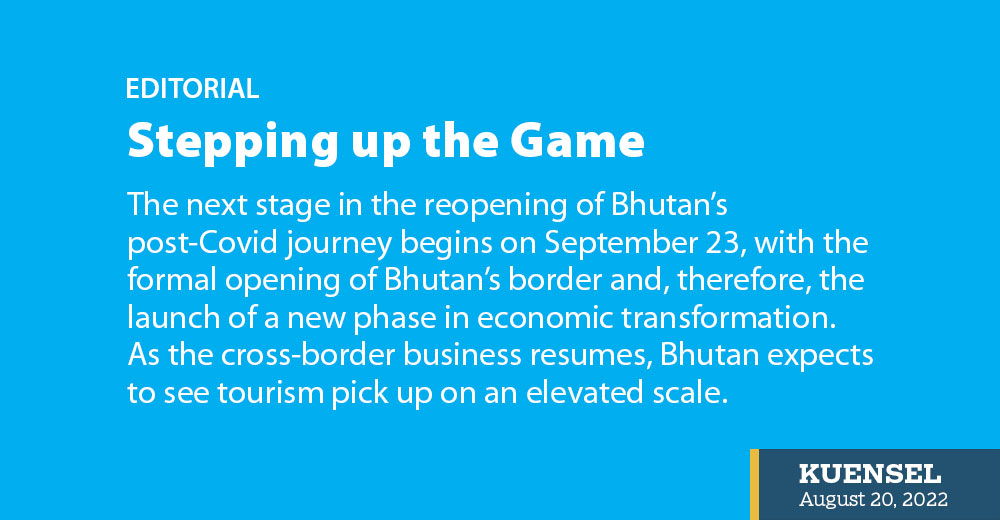The next stage in the reopening of Bhutan’s post-Covid journey begins on September 23, with the formal opening of Bhutan’s border and, therefore, the launch of a new phase in economic transformation. As the cross-border business resumes, Bhutan expects to see tourism pick up on an elevated scale.
Opening the gate does not mean an immediate flood of tourists but, going by the government’s determination to return to the policy of high-value low volume tourism, an important question is, are we ready to offer an enhanced experience? The immediate answer is that there is much to be done. The requirement for this new experience ranges from basic infrastructure like washrooms along the highways and waste-free pathways to an atmosphere where visitors are spared the discomfort of jostling crowds and the spirit of reverence at sacred places.
It would be unrealistic to expect the perfect experience from day one. Given the transformed approach, TCB, as the promoter and regulator, will monitor standards of hotels and homestays, capability of guides, quality of transport, and readiness of sites. The industry players need to focus on elevating their services to the best of global standards in an atmosphere of healthy competition.
We are talking about an experience beyond TCB and tourists. We are talking about visitors who are seeking an experience not available elsewhere. And we are talking about a country committed to being such a destination.
The alarm that we see is a natural reaction to change. Today, Bhutan is sensing and experiencing real transformation. Hundreds of operators, hoteliers, homestays, guides, and transporters are required to improve services. This requires resources and skills that some do not readily possess. It requires some Bhutanese to be less dependent on external partnerships. It means short-term sacrifices for long-term benefits.
Does this sound theoretical? Yes, it is an aspiration. Is it doable? Yes. It is a commitment.
Bhutan is fortunate that we are still a potentially high-end destination. Although recent trends indicated a descent towards mass tourism, this is a turnaround – back to a vision admired by the world.
With most of the world still reeling from the debilitating impact of the pandemic, we should not expect a rush of visitors. Referring to Indian tourists visiting Bhutan, former Bhutanese Prime Minister, Dasho Tshering Tobgay, told a webinar audience this week that the Indian Prime Minister, Mr Narendra Modi, had said that it was most natural for Bhutan to cap the number to protect a small population, fragile economy, and limited infrastructure. From the trends of the past month, we also see that Indian visitors are ready to pay the SDF of Nu 1,200 and agree to stay in TCB-certified hotels.
Globally, the promise of a high-value low volume experience has, by and large, received a positive response globally and raised expectations within the international tourism industry. With the TCB initiative to step up marketing and a larger plan underway to promote Bhutan, our high-end tourism vision is on the horizon.
The government and the people of Bhutan need to come together to help build the Royal vision of a nation appreciated and trusted by the world.


